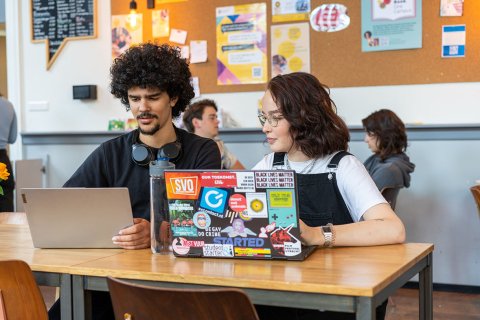Study programme
The research Master's programme Musicology comprises two years (120 EC). Each year is divided into two semesters, running from September until January and from February until June. A semester is divided into two study periods.
Curriculum
The programme consists of compulsory courses, electives, an internship or study abroad and a thesis. Have a look at the study schedule (PDF).
Year 1 | Compulsory courses
During your first year, you take a series of interdisciplinary and disciplinary compulsory courses. There are also two modules on research methods and techniques in study period 2.
Part of the required interdisciplinary courses (up to 10 EC) will be taken at the national research schools relevant to the programme (Huizinga Institute for Cultural History, Research School for Media Studies, National Research School in Medieval Studies, Netherlands Institute for Cultural Analysis, Netherlands Research School of Gender Studies) and will be selected by you together with your mentor.
Year 1 | Electives
In study periods 2 and 4 of your first year, you and your mentor will also choose two electives consisting of research seminars and/or tutorials targeting your specific research interest.
Year 2 Internship / study abroad and thesis
In the first semester of the second year, you can study abroad, do an internship, or complete additional course work (30 EC, including course offerings provided by the national research schools). In the second semester of that year, you will write your Master's thesis.
Examples of recent theses
- Touching your ears: towards a materiality of sonic intimacy in ASMR videos
- Sound cinema, deafness, and hearing impairments: toward a new theory of audio-vision
- Connecting refugees through music: charity organisations and the instrumentalisation of culture
- Nationalism and national culture in Indonesian art music and performances (1900-2018): reflections from postcolonial perspectives
Thesis awards

- Gabriel Harmsen received the Dr. Albert van der Zeijden Thesis Prize 2023, granted by The Dutch Centre for Intangible Cultural Heritage and Utrecht University for his thesis Traditional Folk Music in a Polarizing Europe: An Expedient to Cultural Sovereignty?
- Moira de Kok was the winner of The Faculty of the Humanities Thesis Prize 2023 for the Best Research Master Thesis and the Hélène Nolthenius Thesis Prize of the Royal Society for Music History of the Netherlands (2023) for her thesis Sounds of Solidarity: Music in the 1984-85 Miners’ Strike
- Helen Herbert was awarded an honorable mention for the Hélène Nolthenius Thesis Prize of the Royal Society for Music History of the Netherlands (2023) for her thesis Josquin in Black and White: Materiality in Early Twentieth-Century Photographs of Historical Music Sources at Universiteit Utrecht’s Josquin Archief
- Liselotte Podda received the Vliegenthart Thesis Award 2020 for her Master's thesis Negotiating a Sea of White: Whiteness and Diversity in Dutch Opera Practices.
- Sonja Hamhuis was also a finalist for the Award, with her thesis Music Moves Europe: Perspectives on the EU's Sector-Specific Initiative for Music.
- Joris van Son was the winner of the Virtus Thesis Award of the Society for Nobility Studies (2018) and the Hélène Nolthenius Prize of the Royal Society for Music History of the Netherlands (2020) for this thesis Studying music at home: Eighteenth-century Dutch domestic music-making.
- Iris Bouman was a finalist for the Vliegenthart Thesis Prize in 2017, with her thesis Operetta at the Berlin Metropol Theater 1934-1937: On the Relationship Between Operetta and National Socialist Ideology.

Educational methods
- seminars
- self-study
- internship (optional)
Research internship
Doing a research internship is also a good way to forge connections with the (international) research infrastructure for which you are training. Recent internship positions held by our students include:
Sound Studies Lab, University of Copenhagen | Project “Music and Human Rights”, John F. Kennedy Institute, Berlin | Centre for Gender Studies, Groningen University | Het Gelders Archief | Artifex (in Dutch).
Keep in mind that different organisations have different working languages. Therefore, be sure your language skills align with your desired internship provider, within the Netherlands or abroad.
Examinations
- papers
- assignments
- presentations
Each course requires a final paper or project. Weekly reading and/or writing assignments are compulsory. Courses usually include at least one presentation.
Extra opportunities
For students looking for an extra challenge in addition to their Master's, there are several options. Utrecht University offers several honours programmes for students looking for an extra challenge. Honours education is followed on top of your regular Master's programme and goes beyond the regular curriculum. Honours programmes are available at interdisciplinary level and allow you to work on projects that transcend your own discipline.

